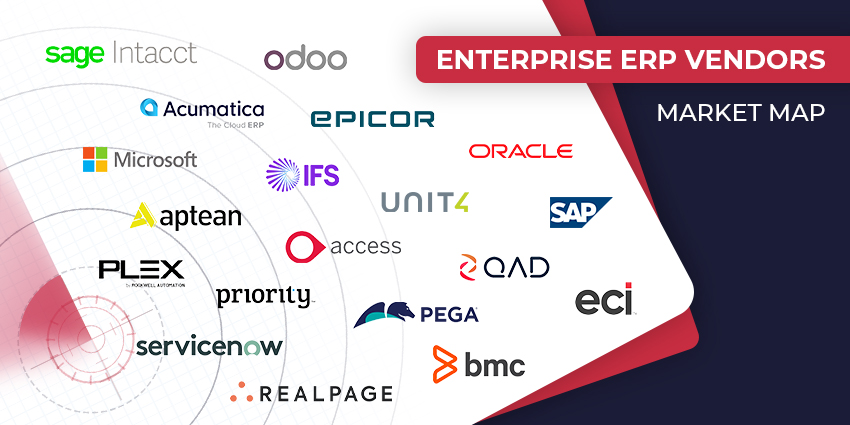ERP systems used to be back-office territory, focused on accounting and inventory. Now, they’re evolving. The top ERP vendors today aren’t just updating software, they’re changing how global businesses work, and grow.
These systems are strengthening efficiency, tackling risk and compliance, and enabling scale, all in one platform. Cloud native is now standard, but increasingly, so is built-in AI, real-time controls, automated audits, and integrations that stretch far beyond finance and supply chain. From frontline service to executive dashboards, ERP is pulling everything into one view.
The challenge? Not every ERP system vendor offers the same toolkit. Some are doubling down on industry-specific depth. Others are racing ahead on platform consolidation. A few are reinventing what ERP even means.
This guide breaks down the top ERP vendors in from the CX marketplace. Who’s innovating, who’s evolving, and who might just be the right fit for enterprise leaders.
The Top ERP Vendors
The Top ERP Vendors Shaping the Future of Enterprise
The ERP market isn’t short on options. But not every vendor can handle the complexity, scale, and compliance demands facing enterprise teams right now.
Some are built for heavy industry, with deep manufacturing and supply chain roots. Others shine in services and financial operations, offering flexibility across multi-entity, multinational rollouts. A few are exploring smarter risk tooling, embedded AI, and seamless connections into CX, CRM, or even contact center environments.
This isn’t a ranking, and there’s no one-size-fits-all. It’s a curated look at the ERP vendors making an impact in 2025 and why they might be the right fit for specific companies.
Oracle
Cloud and technology solutions provider Oracle produces a host of tools for business leaders, ranging from AI and machine learning platforms to data lakes, compliance systems and networking tools.
Their ERP software suite, Oracle Cloud ERP (also known as Fusion Applications), includes a standalone module called Oracle Fusion Cloud Risk Management and Compliance to enforce internal controls, monitor SoD, and keep audit-ready workflows running 24/7.
In 2025, Oracle rolled out enhancements that make user roles more granular, streamline audits of access privileges, and integrate AI for early detection of anomalous activity. At the same time, Oracle continues to push patch updates, covering CVEs in database components like GoldenGate, XML DB, and more.
There are also built-in solutions for supply chain and manufacturing insights and enterprise performance management, with profitability and cost reports, account reconciliation, and cloud data management.
Microsoft
Microsoft is one of the most influential ERP vendors in enterprise environments. The latest “Release Wave 1” (April–September) brought a stack of updates built around real-world pain points: compliance, licensing oversight, and smarter finance workflows
Take compliance in manufacturing. The Dynamics 365 Supply Chain Management update released in June adds richer quality control features. Teams can experiment with digital batch records, electronic signatures, and tie‑ins to corrective/preventive action (CAPA) management.
Meanwhile Dynamics 365 Finance now includes a real-time account reconciliation agent, and a revamped journal framework built for high-volume, multicompany environments.
What makes Microsoft stand out among ERP software vendors this year? It’s the balance between ambition and pragmatism. Copilot-powered agents help automate bank reconciliation, tax compliance and demand forecasting. Security and governance are baked into the core. Because everything lives in Azure, enterprises get global scale without compromise.
SAP
Software innovators, SAP specialize in delivering a range of ERP solutions targeted at companies from different industries and sectors. The flagship solution from the company is the SAP Cloud ERP, a fully modular cloud solution powered by AI and analytics. The technology includes a host of capabilities for accounting and financial processes, sales, sourcing, and procurement.
In 2025, SAP doubled down on compliance-first initiatives, releasing security updates almost monthly and responding quickly to high-severity CVEs. SAP also rolled out tailored compliance tooling in its Trust Center, designed specifically to help customers align with EU’s DORA and NIS2 legislation.
Whether teams are running S/4HANA Cloud or managing on-prem edition lifecycles, SAP delivers deep modularity across finance, SCM, manufacturing, and service, with integrated audit trails and traceability included. It’s one of the few top ERP vendors that still excels at global scale, vertical depth, and regulated industry governance.
Sage Intacct
With numerous products covering the financial, accounting, and industry management landscape, Sage Intacct supports businesses all over the world. The company’s ERP software systems are customized to suit the requirements of different companies, allowing brands from each industry to leverage specialist services based on their needs.
Its “Dimensions” engine lets teams slice P&L and balance sheet data across unlimited tags: projects, locations, departments, and clients, without bloating the general ledger. That means better insight, faster closes, and easier consolidation across entities.
Sage has added more automation around revenue recognition, multi-entity consolidations, and audit-ready dashboards built into the financial view, helping finance teams keep pace with internal and external compliance needs. PwC Control Insights, built into the platform, runs continuously to monitor anomalies, flag exceptions, and support internal control requirements.
Acumatica
Focused heavily on the Enterprise Resource Planning space, Acumatica delivers solutions for small and mid-sized businesses, often based in the cloud. Accumatica offers access to a flexible, customizable platform which can integrate with the systems and tools companies already use. Users can also personalize their instances using a low-code or no-code environment.
The Acumatica ERP service features end-to-end analytics and reporting features, with real-time insights and dashboards available for all kinds of employees. The modular system can also be billed per-use, so companies only pay for the functionality and data they use. There’s also support for AI-powered automation built into the platform.
But it’s not just about ease of use or flexibility that stands out. Behind the scenes, Acumatica embeds process-level compliance checks, barcode-tracked quality workflows, and documentation controls that serve regulated environments.
Odoo
Odoo is unique among ERP vendors for its modular, open-source approach. Users can build their own custom platform with tools for project management, inventory management, invoicing, accounting and more. There are also tools available for marketing, development, and sales.
The 2025 launch of Odoo 18 brought a bunch of upgrades without the complexity like AI‑powered workflows, redesigned mobile UX, and stronger compliance tools built into the architecture.
Under the hood, Odoo includes role‑based access control (RBAC), OAuth and JWT authentication, end‑to‑end encryption, and audit trail logging, features critical to meeting GDPR, CCPA, or financial reporting regulations.
At ETL scale, Odoo remains lighter than some top ERP vendors, but that’s the point. It’s scalable, modular, and purpose‑built for teams that want ERP power with finance‑grade compliance, flexibility, and a clean interface.
Epicor
Epicor’s Kinetic platform is firmly aimed at manufacturing, distribution, and field‑service organizations. It’s 2025 roadmap shows clear movement toward compliance-first ERP design. Epicor Prism, the AI layer, now accelerates insight mining across supply chain, finance, and quality control workflows, with corrective suggestions built right into the system UX.
On the GRC front, Kinetic ships with built‑in governance and compliance modules: role-based controls, audit logging, internal-control documentation workflows, and carbon tracking for sustainability reporting, all aligned with ISO and industry standards.
Epicor also relies on Microsoft Azure encryption and update frameworks to secure data at rest and in motion. For regulated sectors, Epicor has built in ITAR compliance support and consultants to tailor workflows around DoD, DCAA, or DCMA requirements using Azure Government and custom controls.
IFS
Multinational software company IFS AB provides access to numerous cloud-based tools and services for business process management. With a number of ERP solutions to offer within the IFS Cloud, the company addresses the unique needs of specific industries related to finance, project management, Human Resources, and procurement.
Recent moves include launching Nexus Black, a customer‑centric AI initiative for predictive maintenance, scheduling optimization, and autonomous decision-making. It’s built on industrial use cases rather than generic chatbots. IFS also offers dedicated compliance engines for tasks like CIS reporting, automatic HMRC verification, and audit traceability for UK and European project contractors.
The multi-tiered solution can be adjusted to the specific financial and compliance needs of service industries, manufacturing companies, construction, and energy brands. Users can also take advantage of integrations with existing software platforms and tools.
Unit4
Unit4 produces FP&A, HCM, S2C, and ERP tools for companies from a variety of industries worldwide. The organization’s Enterprise Resource Planning software combines tools for financial management, project management, procurement, HR, payroll, and reporting into one package.
Its 2025 roadmap focused heavily on user experience and vertical enhancements. Key additions include low-code extensibility via the App Studio, more flexible project billing models, and role-based dashboards tailored for finance leads, project managers, and HR admins.
Like many ERP vendors, Unit4delivers native GDPR features, audit logs, and financial governance modules that align to public sector procurement frameworks and non-profit reporting obligations. It also maintains strong regional compliance support in the UK, Nordics, and across the EU, something not all ERP software vendors can say.
Aptean
Aptean is one of those ERP vendors that thrives by going deep, not wide. The company offers industry-specific ERP solutions for food & beverage, manufacturing, distribution, and pharmaceuticals. All include compliance and traceability built in from the start.
What makes Aptean unique is that it doesn’t offer a single monolithic ERP. Instead, its suite includes purpose-built platforms tailored for different sub-sectors. For example, Aptean Food & Beverage ERP offers pre-configured workflows for FDA, FSMA, and EU food compliance. Aptean Industrial Manufacturing ERP comes with built-in ISO and ITAR tracking features.
In 2025, Aptean launched several AI-enhanced tools for production scheduling, digital quality checks, and demand forecasting, helping customers reduce waste and stay ahead of regulatory bottlenecks. Its cloud-based solutions now run on Azure and offer full data encryption, audit readiness, and regulatory sandboxing for sensitive operations.
Access
Access is one of the UK’s best-known mid-market ERP vendors, and it’s grown into a serious contender for organizations looking to modernize without the sprawl. Its ERP solutions cover finance, HR, supply chain, and compliance, with strong traction across healthcare, construction, and professional services sectors.
In 2025, Access expanded its cloud-native Access Workspace suite, adding more embedded reporting tools, smarter role-based access control, and secure mobile workflows that help organizations maintain compliance on the go.
For financial operations, Access ERP includes automated invoice matching, regulatory e-invoicing support, and HMRC MTD compliance. The platform also integrates directly with Access Financials, HR, and CRM modules, giving teams a single view of operations with audit-ready visibility across every touchpoint.
QAD
Focusing heavily on manufacturing and supply chain companies, QAD provides flexible, cloud-based solutions for the ERP and MRP space. Its Adaptive ERP platform is designed specifically to handle today’s fast-evolving supply chain and regulatory pressures for industries like food & beverage, life sciences, and automotive.
In recent months, QAD introduced Champion AI, a new intelligent assistant embedded into workflows to flag production or inventory issues before they cascade into compliance headaches. The company also rolled out a “Proof of Capability” service. This lets enterprises test-drive QAD Process Intelligence using their own data, and see inefficiencies and ROI in real time.
Finance teams will also appreciate built-in multi-entity reporting and audit traceability, plus continuous alignment with global financial controls. For manufacturers with global spread, QAD delivers both domain depth and governance clarity without sacrificing agility.
Priority
With mobile and cloud-based ERP systems on offer, Priority promises companies a flexible selection of tools. The cloud-based ERP solutions from Priority can be implemented quickly in any environment and include access to their own mobile apps. Additionally, the ecosystem is made up of flexible modules which can adapt to each user’s need.
From a compliance standpoint, Priority’s ERP includes global tax localization, audit controls, and reporting modules aligned with international standards for financial clarity and regulatory readiness.
Priority is another of the top ERP vendors experimenting with AI, too. Its Automation Hub offers RPA-style workflows, NLP chatbots, and behavior-based task suggestions built directly into daily operations, no expensive customization required.
Companies can leverage time and attendance tools for remote and hybrid teams, financial tracking, manufacturing and logistics modules, and business intelligence services. There are also options to integrate project management tools and CRM platforms into the environment.
Plex / Rockwell Automation
Plex, now part of Rockwell Automation, continues to make a strong case for ERP that’s built for the factory floor. With Rockwell’s add-on technologies for the Plex ecosystem, companies can take advantage of connected supply chain workflows, automated to suit their specific needs.
The Plex Smart Manufacturing Platform covers everything from production and quality control to inventory, supply chain, and finance, with tight MES integration and native IoT capabilities. In 2025, Plex enhanced its AI-driven anomaly detection engine, adding predictive quality analytics and inline compliance dashboards tailored to food, automotive, and electronics sectors.
Security-wise, Plex runs on a multitenant SaaS model hosted on AWS, with end-to-end encryption, frequent penetration testing, and full SOC 2 and ISO/IEC 27001 compliance. It’s especially strong in industries focused on traceability, with lot-level tracking, real-time audit trails, and automatic compliance logging baked in.
ECI
Prioritizing the development of custom-made software solutions, ECI delivers flexible ERP platforms built to suit the needs of different industries. The cloud-based portfolio of tools offered by ECI covers everything from workflow management to automated workflows and analytics.
Companies can work with the ECI team to build their ERP environment step-by-step and leverage useful add-ons. ERP add-on technologies include solutions for sales intelligence and customer relationship management. Companies can also access proof of delivery systems and end-to-end analytics.
Recent releases have expanded native support for automated document management, contract traceability, and supplier compliance certifications. That means less reliance on add-ons or manual workarounds in regulated industries. ECI continues enhancing its financial audit dashboards and regional localization support across North America and the UK.
ServiceNow
Specializing in a host of tools for sales and service teams, ServiceNow offers a variety of software solutions. Unlike many other ERP vendors, ServiceNow focuses on providing companies with the tools they need to build their own custom platforms from scratch.
The low-code app development and automation platform ServiceNow App Engine allows companies to select the tools they need for resource management.
The platform’s Governance, Risk & Compliance (GRC) suite is now a core part of ServiceNow’s unified architecture. That means risk, control, policy, and audit management can live alongside workflow and operations logic on the same platform.
In early 2025, ServiceNow shipped its Yokohama release with new AI-powered policy automation, continuous risk assessment dashboards, and dynamic controls designed for evolving regulations like DORA, ESG reporting, and GDPR. The system now automatically identifies out-of-date policies, pushes remediation tasks, and supports third-party risk tracking.
Pegasystems
Pegasystems isn’t frequently mentioned in ERP vendor round-ups, but it’s redefining how process-heavy operations get built, governed, and optimized. Its low-code Pega Platform is increasingly used by enterprises that want flexible workflows with embedded compliance.
In 2025, at PegaWorld, the company unveiled GenAI enhancements across its Blueprint and Knowledge Buddy tools. These are ideal for automating the design and documentation of critical workflows, including compliance and risk processes. Enterprises are using Pega Blueprint to modernize legacy systems with AI-guided architecture mapping, and auto-generated governance logic tailored to regulatory standards.
Although not a classic ERP system, it’s being adopted as one, especially by firms that want compliant operations without rigid legacy platforms. Behind the scenes, collaboration with partners like Cognizant expands its footprint in modernization projects geared for regulatory-heavy environments.
BMC
At first glance, BMC might not seem like an obvious ERP vendor. But its enterprise-grade automation and emerging AI tooling make it a compelling player for operations-heavy back-office environments.
In early 2025, BMC formally split into two separate companies, focusing on Automation & Digital Business (BMC) and Service/Operations Management under BMC Helix, enabling sharper innovation and scaling across workflows and IT automation frameworks.
Its BMC Helix Service Management 25.2 release introduced HelixGPT agents, conversational AI tools designed for custom workflows, service integration, and post-incident analysis. These agents help enterprises automate tasks like dashboard creation, incident response and reporting.
Meanwhile, the BMC AMI suite added Cloud Data Sets (CDS). There’s also AI-guided root cause analysis for mainframe and legacy systems. The company is enabling hybrid operations, auditing, and governance without sacrificing performance or security.
RealPage
Focusing on the Real Estate market, RealPage delivers a host of solutions for companies. That includes digital content services, contact center tools, payment processing capabilities, and accounting software. The company’s flexible approach to ERP solutions allows organizations to mix and match the services they need for documents, facilities, property, and revenue management, among other things.
RealPage’s Lumina AI platform powers predictive revenue optimization, lease automation, and operational forecasting. Data integration now connects property management, facilities maintenance, spending, and resident-facing compliance documentation in automated workflows, ideal for asset-heavy operations with regulatory oversight
For enterprises in real-estate operations that require audit-grade financial controls, document traceability, sustainability reporting, and data-driven scaling, RealPage sits firmly in the mix of modern ERP vendors, even if its focus is specialized.
Ready to Take Your CX and ERP Strategy to the Next Level?
The best ERP vendors today aren’t selling software in a vacuum. They’re building ecosystems: platforms that integrate with customer experience systems, support operational agility, and embed compliance deep into every workflow.
Some platforms on this list are known names, trusted for their enterprise muscle. Others are newer, more focused, or vertically specialized. But all are worth watching.
As ERP systems continue to converge with finance, HR, operations, and even contact center tools, the lines between traditional back-office and front-line technology are fading. Leaders across IT, procurement, and operations now have to align on platform investments that will define the next five to ten years, and there’s no margin for error.
For enterprises wondering where to go next, CX Today has resources to offer:
- Download our research: Explore exclusive reports covering vendor performance, industry trends, and the technologies reshaping ERP and CX.
- Join the CX Community: Connect with IT leaders, CFOs, operations pros, and CX strategists navigating the same decisions in the CX community.
- Meet vendors in person: Check out upcoming events for front-row access to live demos, keynotes, and real-world conversations.
- Master the buying journey: From procurement checklists to implementation tips, the Ultimate CX Guide walks buyers through every step.
Enterprise software is evolving. The expectations are higher, the stakes are bigger, and the smartest leaders know this moment isn’t just about investing in a tool, it’s about investing in what comes next.







